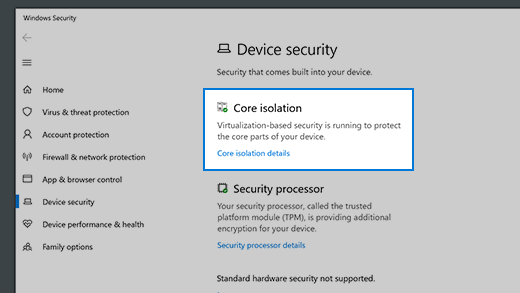
Ensuring Performance and Security: Memory Integrity and Core Isolation
In the dynamic realm of technology, achieving a delicate balance between performance and security is paramount. Two critical strategies gaining prominence are memory integrity and core isolation. Let's explore the significance of these techniques and how they collaborate to fortify the computing landscape.
Understanding Memory Integrity:
Memory integrity involves safeguarding a computer's memory from unauthorized access or modifications. It ensures that the data stored in memory remains accurate and unaltered, preventing potential security threats and vulnerabilities.
Understanding Core Isolation:
Core isolation, on the other hand, revolves around the separation of processing units within a computer's central processing unit (CPU). By assigning specific tasks to dedicated processor cores, core isolation minimizes interference between different workloads, enhancing both performance and security.
The Synergy of Memory Integrity and Core Isolation:
- Enhanced Performance: Core isolation contributes to improved performance by preventing tasks from interfering with each other. Simultaneously, memory integrity ensures that data accessed by these tasks remains accurate, fostering a seamless and efficient computing experience.
- Fortified Security: Memory integrity adds an extra layer of security by protecting the integrity of data in memory. When coupled with core isolation, the risk of security vulnerabilities and unauthorized access is further minimized, creating a robust defense against potential threats.
- Optimized Resource Utilization: Core isolation allows for efficient resource management, while memory integrity ensures that these resources store reliable data. This combination optimizes processing power utilization, enhancing the overall efficiency of the system.
- Resilience to Advanced Threats: In the face of advanced security threats, the collaboration between memory integrity and core isolation provides a resilient defense. Isolated cores and secure memory collectively form a formidable barrier against evolving cyber threats.
- Adaptability to Evolving Technologies: Memory integrity and core isolation together create a foundation that adapts to advanced technologies such as virtualization. This adaptability ensures that systems remain flexible and capable of meeting the demands of evolving computing environments.
Implementing Memory Integrity and Core Isolation:
Enabling memory integrity and core isolation on Windows 11 is a straightforward process:
Memory Integrity:
- Open Settings.
- Go to Update & Security.
- Select Windows Security.
- Click on Device Security.
- Toggle the switch to enable Memory Integrity.
- Follow any on-screen prompts to complete the process.
Core Isolation:
- Open Settings.
- Go to System.
- Click on Advanced system settings.
- Under the Advanced tab, click on Settings under Performance.
- Go to the Data Execution Prevention tab.
- Check the box for Turn on DEP for essential Windows programs and services only.
- Click Apply and then OK.
- Restart your computer to apply the changes.
In conclusion, the collaboration between memory integrity and core isolation is pivotal in achieving a well-rounded approach to performance and security in modern computing. As technology advances, the synergy between these techniques ensures that systems remain not only efficient but also resilient to emerging threats. It is known that if you want to enhance your FPS performance during games, you should disable isolation.
